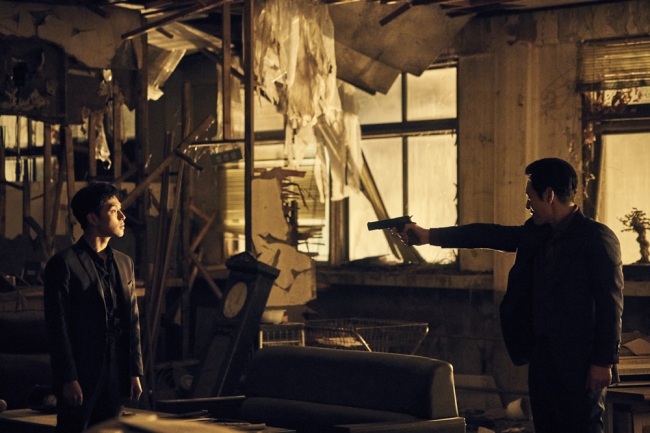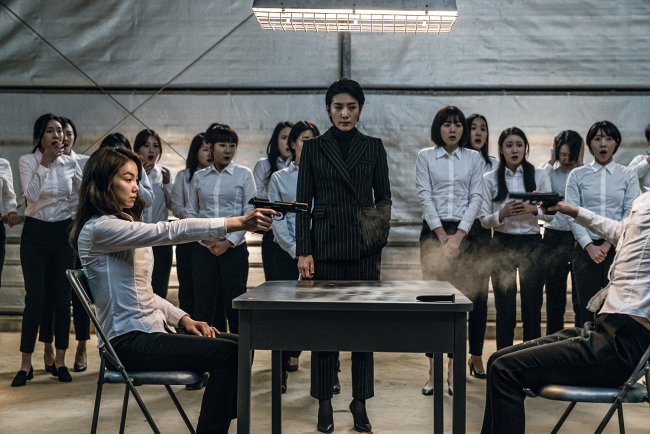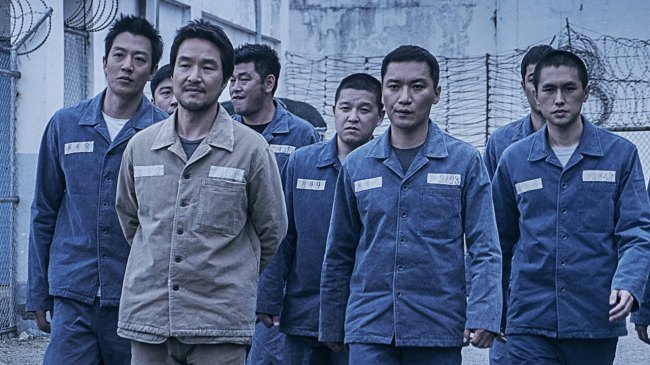[Weekender] Our fascination with crime
Why we are drawn to grotesque stories of murder and violence
By Korea HeraldPublished : May 26, 2017 - 15:44
Crime dramas have been running rampant in Korean film and television.
In cinema, 2017 opened with such flicks as “One Line,” the tale of a surprisingly simple but effective bank scam; “The Prison,” about inmates behind bars that control the outside world; and “Fabricated City,” featuring a team of hackers uncovering a massive digital conspiracy.
The list goes on and on. Two of the five Korean films currently screening at the Cannes Film Festival are crime thrillers: “The Merciless” is about the precarious relationship between two criminals, while “The Villainess” centers on a ruthless assassin.
Over on the small screen, “Whisper” focuses on a wrongly fired cop seeking revenge against the lawyers who framed her father for murder. The sci-fi drama “Circle,” which kicked off Monday, depicts detectives solving crimes in a dystopian world of controlled humanity.
In cinema, 2017 opened with such flicks as “One Line,” the tale of a surprisingly simple but effective bank scam; “The Prison,” about inmates behind bars that control the outside world; and “Fabricated City,” featuring a team of hackers uncovering a massive digital conspiracy.
The list goes on and on. Two of the five Korean films currently screening at the Cannes Film Festival are crime thrillers: “The Merciless” is about the precarious relationship between two criminals, while “The Villainess” centers on a ruthless assassin.
Over on the small screen, “Whisper” focuses on a wrongly fired cop seeking revenge against the lawyers who framed her father for murder. The sci-fi drama “Circle,” which kicked off Monday, depicts detectives solving crimes in a dystopian world of controlled humanity.

Primal instinct
There are many reasons people are drawn, whether consciously or not, to stories of crime, psychologists say.
The first and simple reason is instinct, psychologist Kwak Geum-joo says. Despite our increasingly refined modern lives and the strengthening of laws, and no matter how mild-mannered a person may seem, all human beings harbor “a primal instinct toward aggression and attack,” she told The Korea Herald.
Some of the top box office hits in Korea have delved into the gruesome details of serial killings, such as Na Hong-jin’s 2008 thriller “The Chaser” and Bong Joon-ho’s 2003 film “Memories of Murder.”
“The truth is, crime flicks have always existed and always been popular,” said Kwak. “Grotesque crimes stoke our curiosity. We are drawn to them in spite of ourselves, due to our base nature.”
Another reason is that we feel a deep-seated sense of vicarious satisfaction while watching characters radically break the rules, Kwak added.

American psychologist Konrad Bresin, who specializes in abnormal psychology, implied in a 2013 study that a sort of healing, anger-reducing effect occurs through the release of aggression.
On the other hand, some argue the thrill that comes from watching repulsive acts could be the result of a defense mechanism.
In an article last year, criminology professor Scott Bonn argued that people “receive a jolt of adrenaline as a reward for witnessing terrible deeds.” The powerful, stimulating hormone adrenaline could be released to offset the horror and fear we feel at disastrous and criminal events, Bonn said.
“The euphoric effect of true crime on human emotions is similar to that of roller coasters or natural disasters,” he wrote.
Still others say Koreans’ recent fascination with crime has a more realistic and practical basis.
On screen, characters are able to poke and prod into scenes of crime at will, conducting probing investigations that viewers would not regularly have access to, says scriptwriter Kang Min-hoo.
“We read news reports of horrible crimes and we feel a natural need to know,” he said. “We want to see the steps behind how they’re carried out and how (the criminals) are discovered and punished. Crime shows give us a peek into that process.”

Too much of one thing
Crime had been a fixture in Korean film and TV long before the uncovering of the recent Choi Soon-sil scandal and ensuing impeachment of Park Geun-hye.
Some of the most-viewed crime films in Korean cinema history came in 2015. “Veteran,” which spotlights a maniacal billionaire as its lead villain, became the most-watched Korean film in the past five years, drawing some 13.4 million viewers, according to the Korean Film Council.
“Master,” which features Lee Byung-hun as a lavish international scam artist, and “Inside Men,” which many said exposed the true dark underbelly of Korean politics, each sold 7 million tickets.
This year’s crime flicks, meanwhile, have been lagging behind. “The Sheriff in Town,” about a small town sheriff investigating a drug dealer masquerading as a businessman, is currently sixth place in the box office with a total of 2.5 million ticket sales.
“Crime films reflecting reality have become a genre that many regard as guaranteed box office hits,” the Korean Film said wrote in a recent report. “But viewers’ exhaustion with the material has led to fallling ticket sales.”
By Rumy Doo (doo@heraldcorp.com)
-
Articles by Korea Herald


![[Exclusive] Korean military set to ban iPhones over 'security' concerns](http://res.heraldm.com/phpwas/restmb_idxmake.php?idx=644&simg=/content/image/2024/04/23/20240423050599_0.jpg&u=20240423183955)

![[Graphic News] 77% of young Koreans still financially dependent](http://res.heraldm.com/phpwas/restmb_idxmake.php?idx=644&simg=/content/image/2024/04/22/20240422050762_0.gif&u=)



![[Pressure points] Leggings in public: Fashion statement or social faux pas?](http://res.heraldm.com/phpwas/restmb_idxmake.php?idx=644&simg=/content/image/2024/04/23/20240423050669_0.jpg&u=)










